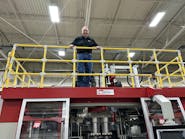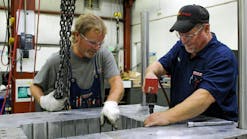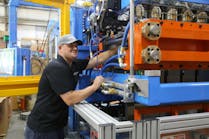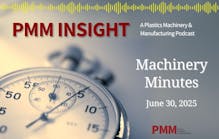The proposed removal of the word "unexpected" from an industry standard has prompted a lot of discussion. Industry players gave their perspective on how the change to OSHA's Control of Hazardous Energy Lockout/Tagout standard could play out.
Peter Gardner, a Niigata representative, said he believes a wording change would make the regulation more objective. "The term 'unexpected energy' is rather subjective, as a poorly trained or [poorly] informed person may not understand and expect that energy will go to pumps or motors when a relay fails, or a limit switch is bypassed," said Gardner, who is VP of sales and GM of the company's North American operations for the DJA Global Group, Wood Dale, Ill. "By removing the term 'unexpected' as it relates to the lockout/tagout procedures, it becomes a very objective thing. No energy at all can go to the motors."
Additionally, the proposed rule change wouldn't necessarily mean any modifications to injection molding machines because, when the main power is turned off and lockout/tagout procedures are implemented, no energy can go to the motors. "However, practically speaking, it becomes cumbersome to do frequent mold changes this way, because when the main power is shut down, the machine controls need to re-boot, and barrel heaters have to come back up to temperature; this all takes time," Gardner said.
The best solution for mold changes is to have one power source for motors and pumps that could cause a hazard, and another power source for controllers and heaters that can be left on, he said.
All Niigata all-electric machines bound for the U.S. have separate breakers for motors, Gardner said. But, if the proposal becomes law, companies with older machines will need to retrofit them if they want to avoid complete shutdowns during mold changes. Retrofits could cost $2,000 to $3,000 per machine, he said. The other option would be to accept the fact that the press must be completely turned off for mold changes, which could be viable for machines that have infrequent mold changes.
Like Gardner, chief engineer Larry Keller, of Milacron LLC, Batavia, Ohio, does not believe that the proposed standard change would require equipment modifications but instead believes it might place more liability on employers. "It's about how you interpret 'unexpected' and 'energy,' " he said. Taking out the word "unexpected" means "you are now relying on people to anticipate every possible hazard that may exist," he said. "But it's not practical to think of everything."
Milacron machines all have lockouts. "So, I don't think it will change how machines are designed as much as how a court of law will interpret it and who is responsible. So, as a supplier, it opens us up to more liability," Keller said.
So what can plastics processors do? Focus on training, Keller said. "Pull out the ANSI guidelines and read up on the hazards of your machines." Training and intent are important, he said
Injection molder Dynamic Group, Ramsey, Minn., conducts annual lockout/tagout training to ensure employees stay current. "We believe in safety; we engage our employees in it, and we take it seriously," President Steve Kalina said.
At Dynamic, any employees who have technical involvement with the machines or are in a leadership role receive the training. "We believe in not just meeting standards, but in having a safe workplace," he said. "This training sets the tone that we're actually trying to make it a safer workplace."
Lisa Jo Lupo, correspondent
Contact:
DJA Global Group, 630-361-6020, www.niigata-us.com
Dynamic Group, 763-780-8674, www.dynamicgroup.com
Milacron LLC, 513-536-2000, www.milacron.com





